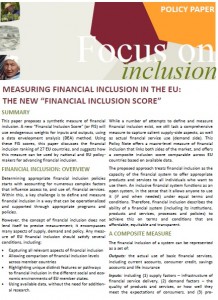Access to Finance Barometer
As part of a multi-component project funded by European Commission, MFC is developing and testing methodology of Access to Finance Barometer that will provide insights into the country-level access to finance issues and priorities in 10 EU countries.
The purpose of the AFS Barometer is to assess the level of financial inclusion and conditions of access to finance in EU member states to identify gaps leading to the exclusion of certain groups of the population. Although, the level of financial inclusion is in general high in the EU, certain minority groups are constrained in enjoying appropriate access to quality financial services, such as a basic bank account, microcredit, etc.
The research focused on identifying weaknesses in the supply of financial products/services, limitations in the abilities to use the full potential of financial services offered.
Scope of research
The EU Barometer is based on the access to finance scorecard diagnostic methodology developed by MFC and implemented in Belarus, Turkey and currently in Poland.
The Barometer looks at financial inclusion from two perspectives – usage of financial products/services as well as the conditions of access.
Usage – share of the population and different socio-economic groups using different types of financial services, including accounts and payments, deposit and investment, credit and insurance products
Access to financial services – the conditions conducive to access, grouped into the supply-side, demand-side and policy-side considerations
Research methodology
The research utilized two methods and conducted in two phases:
- secondary data review utilized international statistics to ensure comparability of the results between the EU states to seek the gaps in financial inclusion.
- primary research concentrated on gathering contextual information to better understand the drivers of financial exclusion and priorities in addressing identified limitations. This part of research was carried out using a modified Delphi method, in which a series of expert interviews is carried out to gather views on the priorities in addressing financial inclusion gaps.
Outputs
Outputs Results of the assessment of the level of financial inclusion and access conditions are summarized in two policy papers:
- Debt, Borrowing and Over-indebtedness: A Country-Level Monitoring Framework Full text, Summary paper
- Measuring Financial Inclusion in the EU: the New “Financial Inclusion Score” Full text;

